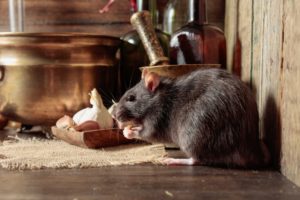How Cold Weather Impacts Animal Home Intrusions
Winter is the time to stay indoors and enjoy the comfort of your home. Just like humans enjoy the warmth their home provides, so do wild animals. As it gets colder outside, animals seek warmth and oftentimes take refuge inside people’s homes. Animals like squirrels, mice, rats, raccoons, and skunks are known to invade homes throughout the winter. Take a look at some of the ways cold weather impacts animal home intrusions and what you can do to prevent them from entering your home.

How Do Animals Survive the Winter?
There are three ways animals survive winter: migrate, adapt, and hibernate.
Migrate
Migration means moving, and some animals will migrate from a colder part of the world to a warmer part during the winter. By moving from a cold part of the world to a warmer one, animals can find food sources that are usually unavailable during the winter months. While birds are the most well-known animals to migrate, some mammals like bats and elk migrate too.
Hibernate
Most people are familiar with the concept of hibernation for animals. When animals hibernate, they go into a special kind of deep sleep, and their systems slow down to preserve energy. Animals will seek warm and secluded places to hibernate throughout the winter.
Adapt
Some animals change with the seasons, meaning, they’ll adapt to the temperature and winter conditions. They may store food, grow a thicker coat, or change the color of their coat altogether. No matter how they adapt to the weather, animals who adapt are the most likely to invade your home.
Wildlife and Your Home
During the winter, homeowners adjust their thermostats to make their homes warm and cozy. Animals enjoy the warmth and coziness of a house too. That means that they’ll find a way to access a warm home, and believe it or not, most animals don’t enter the home through the front door, but instead enter through holes and cracks in the exterior of the home.
Wildlife can enter homes through roof vents, plumbing fixtures, construction gaps, eaves, roof joints, and wood trim. Essentially, any opening on the exterior of the home is subject to wildlife intrusion. During the winter, these openings serve as an invitation for wildlife to enter your home.
How to Prevent Animals from Entering Your Home
There are plenty of ways to prevent animals from entering your home this winter.
Seal All Access Points
The best way to prevent animals from entering your home is to seal off points of entry. Once you have a professional seal off entry points on the exterior of your home, be sure to check them monthly or biweekly to ensure that they are still intact.
Trim Trees
Animals can use tree branches to hop onto the roof and enter your home. To prevent this from happening, it’s best to trim low-hanging branches. That will prevent animals from being able to easily access your roof.
Use Repellents
There are multiple animal repellents that homeowners can use to deter wildlife from entering their homes. Chemical sprays, sound emitters, sprinklers, and ultrasound emitters are all safe and effective animal repellents.
Protect Your Home from Wildlife All Year Long
Bay Area Wildlife Solutions is here to protect your home all year long. With 24-hour humane animal removal in Maryland and Delaware, we’re your go-to animal removal company. Contact us now to talk to one of our removal experts.

 302.500.0181
302.500.0181  410.829.6368
410.829.6368